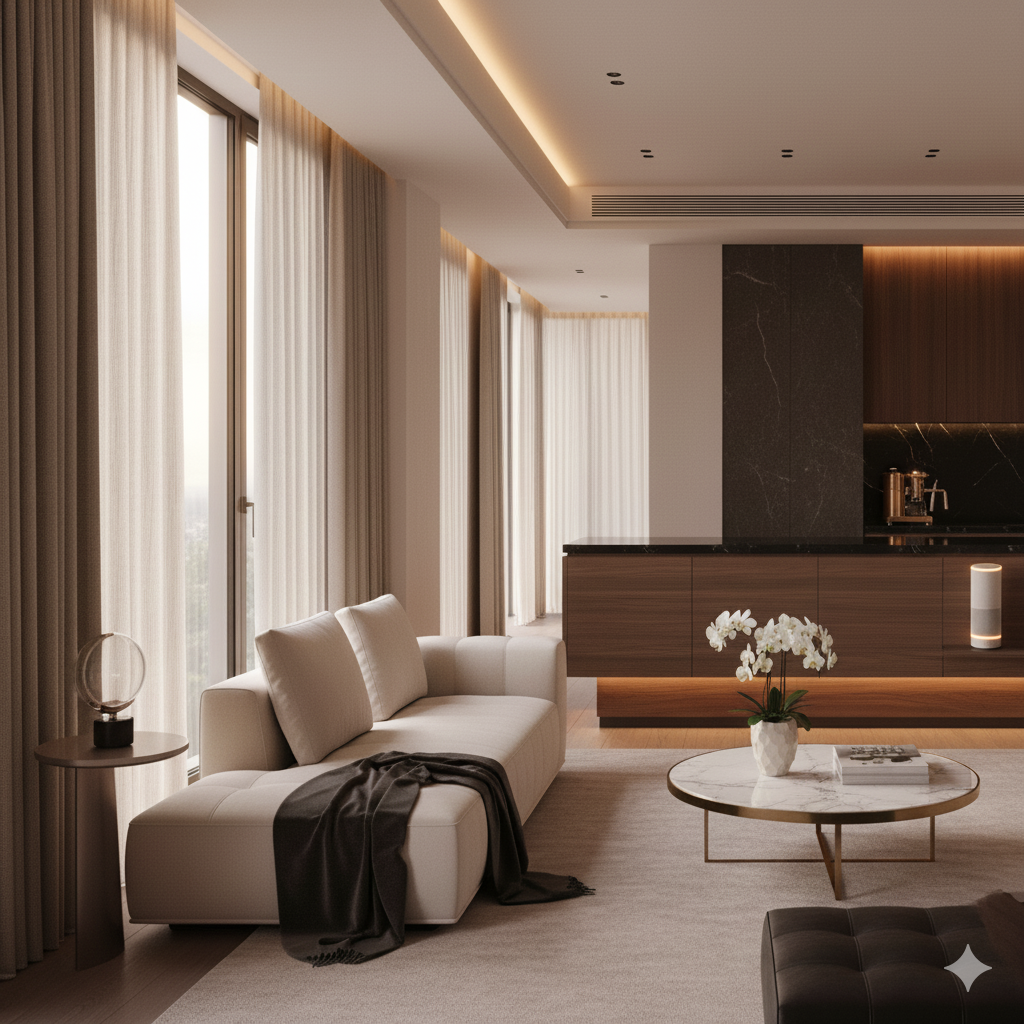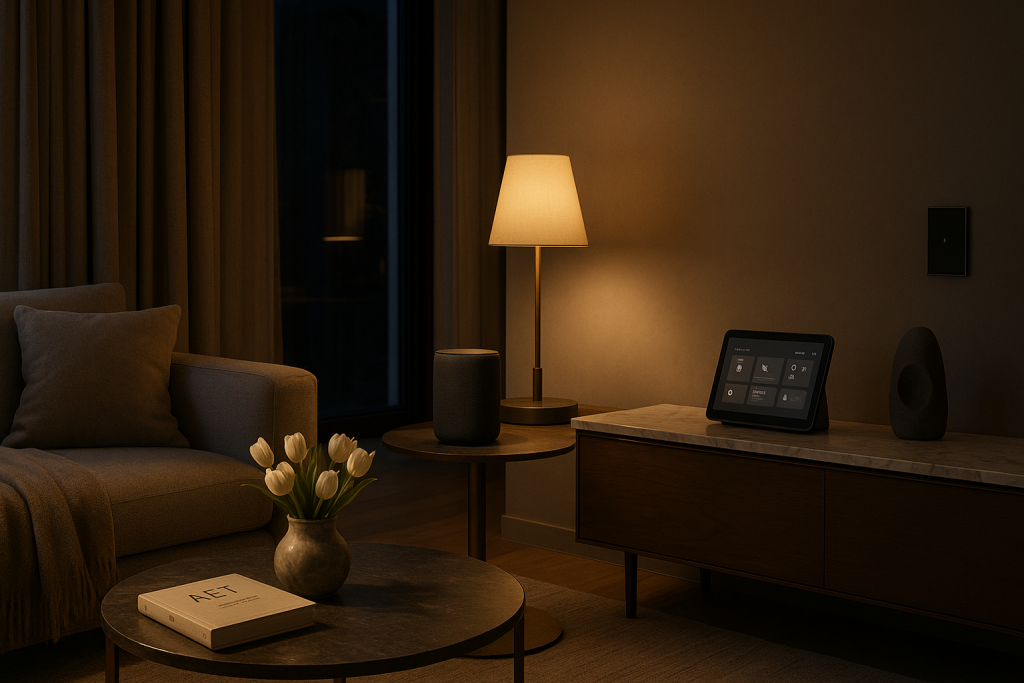There’s a particular brand of magic that occurs when technology becomes so seamlessly integrated into our lives that it simply… disappears. Not into thin air, mind you, but into the very fabric of our daily existence, anticipating needs before we articulate them, adjusting to our rhythms with the attentiveness of a devoted personal assistant. This is the promise—and increasingly, the reality—of artificial intelligence in the contemporary smart home.
Gone are the days when home automation meant fumbling with multiple apps to dim the lights or adjust the thermostat. Today’s AI-powered smart home agents have evolved into sophisticated digital majordomo, orchestrating everything from your morning coffee ritual to your evening security protocols with an elegance that would make even the most discerning concierge envious. The AI-enabled smart home technology market, valued at $15.3 billion in 2024, is projected to surge to $104.1 billion by 2034, reflecting not merely technological advancement but a fundamental shift in how we conceive of domestic luxury.
 The Triumvirate of Smart Home Intelligence
The Triumvirate of Smart Home Intelligence
In the realm of AI-powered home automation, three ecosystems reign supreme, each with its distinctive philosophy and aesthetic sensibility. Amazon’s Alexa commands the largest territory, with 500 million Alexa-capable devices in consumers’ hands by 2025, offering an almost promiscuous compatibility with third-party devices—from budget-friendly options to high-end installations. The Echo lineup, particularly the visually intuitive Echo Show series, functions as both command centre and lifestyle accessory, blending seamlessly into contemporary interiors whilst maintaining formidable functionality.
Google’s approach, conversely, leans into the sophistication of its artificial intelligence heritage. Google Home’s voice assistant is widely regarded as the smartest of the major platforms, leveraging the company’s decades of machine learning expertise to comprehend context and nuance with remarkable precision. The forthcoming Gemini speaker, reportedly arriving with 360-degree audio and a revitalised design aesthetic, signals Google’s intention to marry technical prowess with design-forward sensibility.
Apple’s HomeKit occupies a rather different position in this landscape—more selective, unquestionably more private, and decidedly more expensive. Whilst HomeKit supports approximately 450 smart devices compared to the thousands compatible with Alexa and Google Home, what it lacks in breadth it compensates for with an unwavering commitment to security and privacy. End-to-end encryption, local data storage, and seamless integration with the broader Apple ecosystem make HomeKit the choice for those who consider their domestic data as sacrosanct as their personal correspondence.
Beyond Voice: The Intelligence That Anticipates
The true sophistication of contemporary AI home agents extends far beyond mere voice recognition. These systems employ machine learning algorithms that observe, adapt, and ultimately anticipate. Your AI-powered thermostat doesn’t simply respond to commands; it learns your schedule, comprehends your temperature preferences room by room, and adjusts accordingly. The system recognises when you’re working from home versus entertaining guests, when you prefer cooler sleeping temperatures, and even adjusts for seasonal shifts in your behaviour.
LG Electronics’ smart home AI agent, unveiled at CES 2024, represents this evolution beautifully—a mobile device with sophisticated “two-legged” wheel design that can navigate autonomously throughout the home, engage in complex conversations, and adapt to users’ needs. This isn’t science fiction; it’s the vanguard of what industry leaders term the “Zero Labour Home.”
Consider the possibilities: lighting that adjusts not merely to time of day but to the activity at hand—brighter and cooler-toned for morning productivity, warmer and dimmer for evening relaxation. Security systems that distinguish between your housekeeper’s scheduled arrival and an unexpected visitor. Entertainment systems that curate music based on who’s in the room and what the occasion demands. With approximately 30% of American households having adopted at least one smart home device, and projections suggesting this figure could reach 50% by 2025, we’re witnessing a democratisation of what was once exclusively the province of the ultra-wealthy.
The Aesthetic Integration
One of the most compelling developments in smart home technology has been the industry’s recognition that functionality alone doesn’t suffice—not when these devices occupy our most intimate spaces. The HomePod, with its sculptural mesh design, resembles a contemporary art piece as much as a speaker. Amazon’s latest Echo devices have shed their utilitarian origins for softer, more sophisticated forms that complement rather than dominate a room’s aesthetic. Even smart switches and thermostats now come in finishes ranging from matte black to brushed brass, designed to integrate with rather than disrupt interior design schemes.
The hardware segment dominated the market in 2024, holding more than 48.5% of the market share in autonomous AI for smart homes, underscoring the importance consumers place on the physical presence of these devices. We’re no longer willing to tolerate clunky technology, regardless of its capabilities. The device must earn its place in our homes through both performance and presentation.
Privacy, Security, and the Cost of Convenience
Yet this technological intimacy raises pertinent questions about privacy—questions that sophisticated consumers are increasingly unwilling to brush aside. When your home assistant knows your schedule, your preferences, your shopping habits, and the contents of your conversations, where does convenience end and surveillance begin?
Apple’s HomeKit addresses these concerns head-on with its privacy-first architecture. Data remains encrypted and stored locally on your devices rather than in corporate servers. Apple prioritises user privacy with end-to-end encryption for HomeKit devices, ensuring data remains secure and accessible only to authorised users. This approach comes with trade-offs—fewer third-party integrations, higher costs, and a smaller ecosystem—but for many, these compromises are well worth the peace of mind.
The Voice That Understands
The voice AI segment of the smart home market, valued at $12.7 billion in 2024, is projected to reach $514.62 billion by 2034, representing one of the most explosive growth areas in consumer technology. This astronomical expansion reflects our growing comfort with conversational interfaces and the technology’s improving ability to comprehend natural language with its attendant complexities—accents, colloquialisms, context, and even emotional nuance.
Natural language processing held more than 40.5% of the total market share in 2024, as voice AI systems continue advancing in their capacity to understand and respond to human speech patterns. The difference between asking “Alexa, what’s the weather?” and “Alexa, should I bring an umbrella to my lunch meeting?” may seem trivial, but it represents a quantum leap in artificial intelligence—the ability to infer intention, access contextual information, and provide genuinely useful guidance.
Energy, Sustainability, and Intelligent Living
Beyond convenience and luxury, AI home automation offers substantive environmental benefits. Smart thermostats can reduce heating and cooling costs by up to 23% annually through optimised scheduling and predictive adjustments. Intelligent lighting systems ensure illumination only where and when needed. Energy management systems analyse consumption patterns and suggest optimisations, making sustainability not merely an aspiration but an automated reality.
The marriage of AI and home automation represents perhaps the most elegant solution to the modern dilemma of wanting both comfort and environmental consciousness. Your home can maintain perfect climate control whilst minimising energy waste, all without requiring you to constantly monitor and adjust settings manually.
The Future, Arriving Daily
Looking ahead, the integration of AI into our homes will only deepen. Matter, the new connectivity standard backed by Apple, Google, Amazon, and Samsung, promises greater interoperability between devices and platforms, liberating consumers from the tyranny of ecosystem lock-in. Industry experts note that consumers care less about whose logo appears on the box and more about devices working seamlessly together.
Rumours persist of Apple developing a HomePod with integrated display, whilst Amazon continues refining Alexa’s capabilities with enhanced conversational AI. Google’s forthcoming Gemini assistant promises to leverage the company’s latest artificial intelligence breakthroughs to create even more intuitive, contextually aware interactions.
The Verdict: Which Agent Serves You Best?
Ultimately, selecting your domestic AI companion depends on your existing technological ecosystem, your priorities regarding privacy versus convenience, and your budget. Alexa offers unparalleled compatibility and aggressive pricing, making it the democratic choice for those building comprehensive smart home systems. Google Home provides superior intelligence and contextual awareness for those who value conversational sophistication. HomeKit delivers unmatched privacy and seamless Apple integration for those willing to pay a premium for peace of mind.
Yet regardless of which ecosystem you choose, the trajectory remains clear: artificial intelligence is transforming our homes from passive shelters into active participants in our daily lives. These AI agents represent something rather more profound than mere gadgetry—they embody a fundamental reimagining of domestic life, where technology recedes into the background, working tirelessly and invisibly to create environments that respond to our needs with almost telepathic precision.
The smart home, properly conceived, isn’t about controlling more devices from your smartphone. It’s about creating spaces that understand you, adapt to you, and ultimately, serve you—all with the discretion and attentiveness of the very best concierge. And isn’t that, after all, the ultimate luxury?


